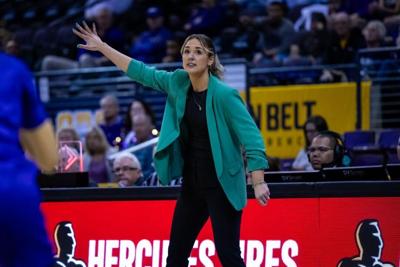The coaching carousel is always spinning furiously this time of year, its merry tune blasting as fiberglass horses bob to swoop up coaching commodities in men’s and women’s college basketball.
If a coach can get a small program to the tournament, let alone win a game or two, larger programs will be making job offers before the team bus gets back to campus.
So it was that Marshall University women’s coach Kim Caldwell accepted the top job at the University of Tennessee after only one season in Huntington. Caldwell guided the Herd to a Sunbelt Conference title, the conference’s tournament championship and the team’s first NCAA tournament appearance since 1997, which ended with a first-round loss to Virginia Tech.
Columnist Chuck Landon said no one should fault Caldwell for leaving, and, as tough as it might be for some Herd fans to accept, he’s right.
Landon cited Tennessee’s offer of $750,000 a year through 2029 — laden with incentives, such as a $150,000 bonus for getting the Lady Vols to the Final Four and another $400,000 for a national title — as one of the main reasons Caldwell couldn’t say no.
The tantalizing challenge of getting Tennessee back on track has to be a motivator, too. The Lady Vols aren’t just a blue blood of the sport, they’re the original blue blood.
Legendary coach Pat Summitt and her seemingly invincible squads ruled women’s college basketball for decades. Over most of that same span, Summitt and the Lady Volunteers were probably the only coach and big-time women’s program casual sports fans could name.
But the Lady Vols haven’t won a national championship since 2008. Once the undisputed cornerstone of women’s college basketball, Tennessee is now home to the second-most national titles, trailing a UConn program that was dominant over the better part of the past quarter century and remains a threat to win it all every year. Caldwell is Tennessee’s new hope, and it would be crazy of her to turn down what is truly a once-in-a-lifetime opportunity.
Not to mention the women’s game at the moment is more popular than it has ever been. Tennessee’s Summitt and UConn’s Geno Auriemma paved the road to the stage the sport now occupies, but that opened their programs up to much stiffer competition across the country.
And record numbers of tens of millions of fans aren’t tuning in just to see great teams play great games, but for the battles between individual superstars, such as Iowa’s Caitlin Clark, LSU’s Angel Reese, Southern Cal’s JuJu Watkins and South Carolina’s Kamilla Cardoso. Who wouldn’t want to be a part of that at a traditional power like Tennessee?
Although more teams are becoming relevant, some universities have advantages in building sustainable, competitive programs. Large state universities like Iowa or big-money institutions like Southern Cal have the resources to beef up their women’s basketball programs. Marshall just isn’t in the same gymnasium, when it comes down to it.
Caldwell could have stayed, and maybe the Herd would be a prominent program in the Sunbelt (or whatever mind-bending conference reconfigurations are to come) and make frequent NCAA tournament appearances. Perhaps the Herd could even make a tournament run here or there. Maybe there’s a universe in which Caldwell forges the program into a national powerhouse. But she caught lightning in a bottle this year, and she shouldn’t be faulted for riding it.
One could even argue that hopping on the carousel is the riskier decision. Expectations in Knoxville are way different than they are in Huntington.
Tennessee just fired its last coach after a run to the Elite Eight, whereas Caldwell’s NCAA appearance likely could’ve secured her a job for life at Marshall. But competitors like Caldwell invite a challenge and bet on themselves. They don’t let opportunity pass them by because of doubt.
Whatever happens, Caldwell likely would have been kicking herself the rest of her life if she hadn’t taken this chance.











